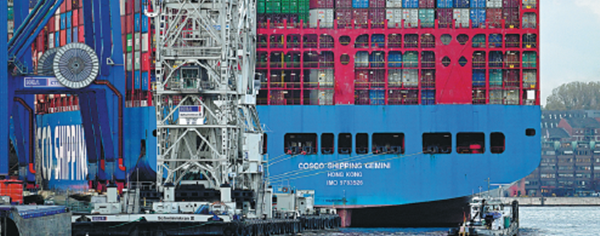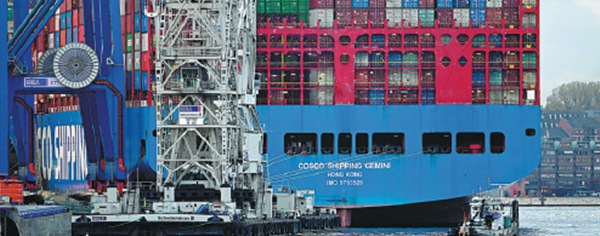
Cosco Shipping Gemini of Chinese shipping company Cosco is loaded at the container terminal Tollerort in the port in Hamburg, Germany. FABIAN BIMMER/REUTERS
Many opportunities ahead, say observers, as demand for high-tech products and infrastructure set to grow
Business ties between China and Germany — two major manufacturing powerhouses and sources of outbound direct investment — will be strengthened and diversified in the coming years via trade in goods and services and high-end manufacturing, said observers and German business leaders.
Despite their economies being hit by the COVID-19 pandemic and a decline in global demand for goods and services over the past two years, the degree of interdependence between the two remains stable in bilateral cross-industry trade, said Sang Baichuan, director of the Institute of International Business at the University of International Business and Economics in Beijing.
Thanks to their complementary trade structure, China and Germany saw their total trade value rise by 2 percent year-on-year to 1.14 trillion yuan ($158 billion) in the first nine months of this year, data from the General Administration of Customs show.
China exports mainly computers, mechanical and electrical products, base metals, chemical products, textiles, garments and household appliances to Germany.
Apart from vehicles and auto parts, mechanical appliances, toolmaking machines, precision instruments, motors, and electrical and pharmaceutical products, Germany's exports to China include daily necessities, excavator parts, optical instruments, sensors, steel plates and chemical products.
Currently, more than 2,000 Chinese companies are running businesses in Germany and more than 7,000 German companies have a presence in China, said the Ministry of Foreign Affairs of China.
For instance, Taicang, a city in Jiangsu province that borders Shanghai, has emerged as a center for German companies because of its business-friendly environment and vast improvements in its living standards.
German companies are ubiquitous in the area. So large is their number, as well as the number of nationals, that there are German restaurants, festivals and schools, according to information released by Taicang's government.
Nearly 60 percent of German companies in China reported improved business operations in 2021, and 71 percent plan to increase investment in the country, according to a report released by the German Chamber of Commerce in China and global consulting firm KPMG early this year.
Stefan Hartung, chairman of the board of management of Robert Bosch, a German industrial and technology group, said that China is the largest single market for the group and offers long-term growth opportunities.
"To tap future long-term potential, Bosch will continue to develop local expertise in China, especially in strategic growth areas such as electrification, hydrogen, fuel cells, artificial intelligence and the internet of things," he said.
Bosch operates four business divisions in China: mobility solutions; industrial technology; consumer goods; and energy and building technology.
The most significant sector, mobility solutions, accounts for 75 percent of the total business.
Under its plan, Bosch's cross-domain computing solutions research and development center will be inaugurated in Shanghai later in November. Phase II of Bosch's united automotive electronic systems plant in Taicang is expected to be completed in the second quarter of 2023.
The Chinese market is demonstrating unique features in consumption patterns, domestic technology and business model evolution. This is becoming more different from other markets and calls for business model localization, said Denis Depoux, global managing director of the Munich-headquartered consultancy Roland Berger.
Engagement and business models of multinational companies must evolve accordingly so as to better participate in China's future development, he noted.
Eager to evolve its agricultural exposure and value chain in China, Bayer, a German agricultural and pharmaceutical group, will relocate its crop protection equipment production site to Hangzhou, Zhejiang province. It involves an investment of more than 300 million yuan in order to meet market demands in China and the Asia-Pacific region by 2025. The company's crop science unit has developed a 10-year strategy to grow its agriculture division and build a more sustainable food production system through a farmer-centric, outcome-based and digitally-enabled approach, which mirrors national goals.
Gao Yong, vice-president for Bayer China, said that the company hopes to introduce more innovative seeds and crop products and solutions, while expanding local cooperation and investment to contribute to the modernization of China's agricultural sector in the coming years.
"Thanks to China's efforts to accelerate innovation and improve its business environment, we have been able to bring in the latest innovative products and solutions more quickly, especially in the pharmaceutical area," Gao added.
As a five-time participant to the China International Import Expo, Bayer's exhibition space this year will increase by 50 percent compared to the 2021 CIIE.
Its crop science division will be presented at the event in an effort to support China's agricultural development.
To open its market to foreign investment in the manufacturing sector, China's National Development and Reform Commission and five other central government branches released a notice in late October to encourage foreign investment in high-end equipment, basic components and key parts for advanced manufacturing as well as high-tech industries.
China will also support foreign investment in R&D, design and modern logistics in the realm of modern services, as well as innovation and applications related to new energy and green and low-carbon technologies, according to the notice.
Xiao Song, global executive vice-president of Germany's Siemens Group, and chairman, president and CEO of Siemens China, said that despite the challenges posed by the COVID-19 pandemic, China is capable of maintaining high-quality growth, given its complete industrial chain system.
"Amid all of the changes and uncertainties in global markets, China's determination to continuously opening up has remained unchanged over the past few years," he said, adding that greater market openness benefits sustainable socioeconomic development in China and helps revitalize the global economy.
Besides providing industrial 5G solutions in China, Siemens supplies industrial equipment and technical solutions for Chinese companies conducting business in overseas markets.
Li Jin, chief researcher at the China Enterprise Research Institute, said many countries' demand for newer infrastructure — such as next-generation oil refineries, new energy vehicles, modern factories, roads, airports and container ports — will provide opportunities for both German and Chinese banks, project design firms, contractors and material and equipment manufacturers.
"China's proposal to explore third-party market cooperation could bring benefits to both Western countries and developing economies involved in the development of the Belt and Road Initiative, without causing a clash of interests," said Li.
As German economic and trade cooperation with China will continue to rise, capable Chinese companies are also inclined to acquire German companies to gain cutting-edge technologies, especially in sectors such as chemistry, construction machinery, environmental protection and biology, he said.






